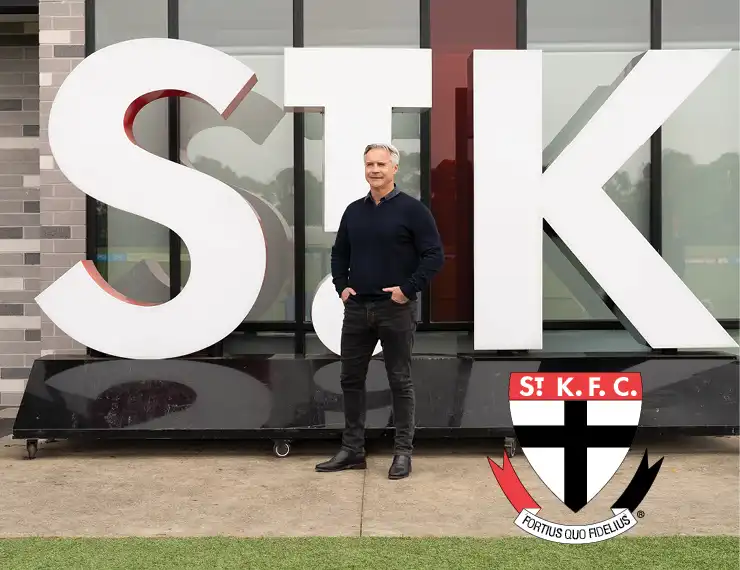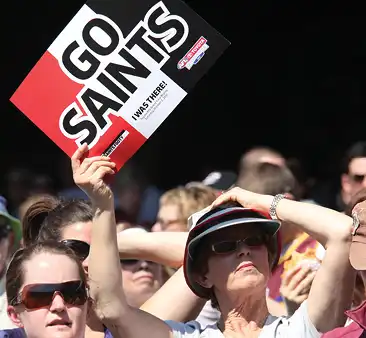Stories
Empowering Australian businesses to future-proof operations with scalable infrastructure and IT solutions.
St Kilda Football Club faced the challenge of integrating advanced technologies to improve both on-field performance and fan engagement. In partnership with 5G Networks, the club’s technology overhaul involved implementing AI-driven analytics, live data tracking, and modernising fan interaction platforms.
Led by Bill Petridis and Chris Larkins, the team focused on enhancing player performance, injury management, and member experience. Under CEO Carl Delana’s leadership, the club adopted cloud-based solutions and GPS systems, resulting in improved operational efficiency and deeper fan engagement. This successful tech transformation set a new standard for leveraging technology in sports management.
St Kilda Football Club, a prominent team in the Australian Football League (AFL), faced the challenge of integrating advanced technology to enhance both on-field performance and off-field fan engagement. The club’s management recognised that leveraging cutting-edge technology could significantly improve game strategy, player performance, and member experience. The challenge was not only to implement these technologies but also to manage them effectively in a high-pressure sports environment.
The situation required a multifaceted approach involving various aspects of technology and strategic management. The club needed to upgrade its technology infrastructure to support live analytics, player tracking, and fan engagement. This involved 5G Networks integrating advanced data analytics, and AI-driven insights while ensuring that all systems worked seamlessly under the intense demands of a football season.
Together with 5G Networks, Bill Petridis, Head of Technology at St Kilda Football Club, addressed these challenges. The focus was on the comprehensive design, implementation, and operation of the club’s technology systems. We emphasised the importance of AI in enhancing player performance and injury management. According to Bill, “AI enhances decision-making, but it complements rather than replaces the human element in coaching and strategic planning.”
In parallel, 5G Networks worked with Chris Larkins, Executive General Manager of Commercial, on integrating modern technologies into fan engagement and revenue management. Chris’s strategy involved leveraging 5G networks for managing traffic and ensuring seamless communication. Joe Demase, managing director at 5G Networks noted, “Chris has been a crucial figure at the club for over five years, overseeing key revenue sources and managing a member base of approximately 60,000. His strategic approach to understanding and responding to customer needs has been instrumental.”
Carl Delana, CEO of the club, provided visionary leadership and drove the adoption of advanced technologies. His background in professional services and sports management allowed him to navigate the complexities of modernising the club’s operations. This included transitioning to cloud-based solutions and integrating GPS and video technology. Joe stated, “Carl’s drive for innovation ensures that the Club remains at the forefront of technological advancements in sports.”
The implementation of these advanced technologies led to significant improvements in both the club’s operational efficiency and its engagement with fans. 5G Networks enabled the implementation and integration of AI-driven analytics which provided the club with real-time insights into player performance and game strategy. This not only enhanced the team’s on-field performance but also supported injury management and game planning.
Fan engagement saw a transformation with the use of advanced CRM systems and personalised interactions, leading to a more satisfying member experience. The club’s strategic partnerships and sponsorships were strengthened, driving greater value for both the sponsors and the club. As Chris Larkins highlighted, “5G Networks focus on evolving communication strategies and utilising modern technologies reflects a forward-thinking mindset that aligns perfectly with the club’s goals.”
Overall, the club’s technological advancements and strategic initiatives demonstrated a successful integration of technology into sports management. The improvements in operational efficiency, player performance, and fan engagement underscored the effectiveness of their collaborative efforts.
This case study illustrates how St Kilda Football Club effectively leveraged technology and strategic leadership to achieve notable successes, setting a benchmark for other sports organisations.


